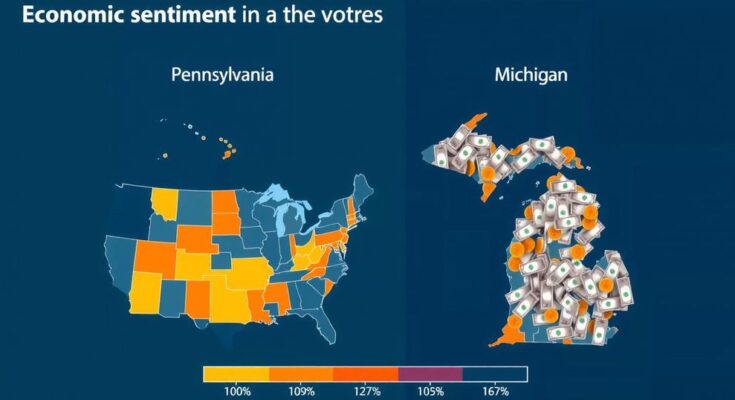Original Source: www.dataforprogress.org
A recent analysis by Data for Progress, in collaboration with the Progressive Change Institute, sheds light on the pivotal role the economy played in shaping voter sentiments during the recent elections in Pennsylvania and Michigan. The data reveals that Kamala Harris’ campaign strategy, which notably included partnering with Liz Cheney, may have overshadowed her economic messaging—a cornerstone resonating strongly with voters amid rising inflation. Voters in these swing states expressed a clear preference for candidates addressing kitchen-table issues, particularly economic distress, leading to an overwhelming inclination toward Donald Trump, who was perceived as the candidate of change despite having his own populist economic policies.
Polling indicates that Harris’ appeal wavered significantly when she deviated from her populist messaging; in Pennsylvania, enthusiasm for her candidacy swung dramatically—by 25 points—when discussing economic issues versus campaigning with Cheney. Both Independents and the Democratic base in these states wished to see Harris tack more towards economic populism, as voters desperately sought answers to their pressing concerns about inflation and economic stability. Harris’ missed opportunity to spearhead a robust economic conversation may have proven costly, depriving her campaign of crucial traction among key demographics.
The overwhelming concerns regarding inflation, with upwards of 90% of voters in Pennsylvania and over 80% in Michigan prioritizing it when considering candidates, shone a glaring light on the notion that economic frustrations could easily dictate electoral outcomes. Surprisingly, even Trump voters expressed a desire for more progressive fiscal policies, such as increasing taxes on billionaires and cracking down on corporate malfeasance, providing Harris with a potential avenue to connect with this demographic that she ultimately overlooked.
While Harris dismissed the power of her economic agenda, Trump continued to dominate the conversation surrounding it. Even as voters recognized the disparity in economic messaging, most believed Trump presented the better chance to resolve their economic woes. Anecdotes of kitchen-table challenges echoed louder than promises alone. Voters yearned for substantive actions against price gouging and corporate greed, yet they could not align these desires with Harris’s campaign rhetoric, resulting in a palpable disconnect.
As both states’ data illustrates, while the voters were intrigued by Harris’ policies, her failure to resonate confidently became a glaring weakness. This polling serves as a crucial barometer, revealing not only a sad tale of missed connections but also an imperative for future campaigns. Rampant economic issues must remain at the forefront, guiding each candidate’s voyage toward voter hearts and minds, which proves paramount in the quest for electoral success.
With economic uncertainties dominating headlines and household discussions, the significance of fiscal policy in electoral outcomes has never been more pronounced. The recent analysis focused on Pennsylvania and Michigan—two critical battlegrounds in the American political landscape where voter preferences were swayed predominantly by economic concerns, particularly inflation. Kamala Harris’ campaign strategies, highlighted in the analysis, raised questions about how approaching economic issues can shape voter enthusiasm and choice. Understanding the intricate dance of economic populism in these swing states allows for an exploration of potential strategies that resonate with a disenchanted electorate seeking genuine representation of their pressing concerns.
In summary, the economic landscape profoundly influenced voter decisions in Pennsylvania and Michigan, and Kamala Harris’ campaign strategy may have squandered invaluable opportunities to engage key demographics through robust economic messaging. The analysis underscores a palpable hunger among voters for candidates to address critical issues like inflation and corporate malfeasance directly. Trump voters, although supportive of populist policies, gravitated towards him due to their trust in his ability to improve the economy. This suggests that future campaigns should prioritize economic issues to align voters’ desires with their promises, ensuring they resonate more deeply with the electorate.



